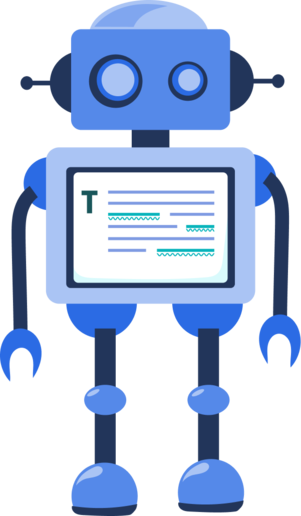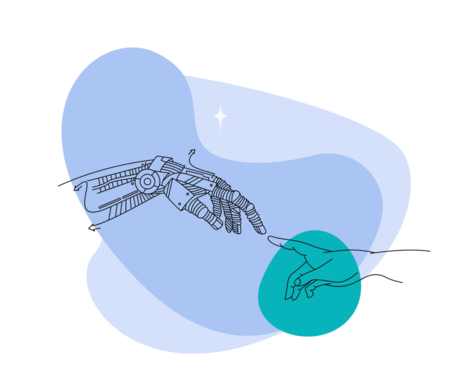AI AND MACHINE LEARNING
FOR PUBLISHERS AND AUTHORS
Discover how artificial intelligence can improve your writing with Izzard Ink Publishing Solutions for publishers and self-publishing authors.

See It in Action
Empower Through AI
Since Izzard Ink was founded almost a decade ago, our mission has been to empower every author with the same tools, processes, and talent that major publishers rely on. That means pushing the cutting edge of the ever-changing self-publishing technology.
We’re driving much of that change ourselves, offering groundbreaking solutions for authors and publishers. Izzard Ink’s machine learning is an especially powerful tool, with streamlined solutions for a whole range of different aspects of the publishing process.


The Manuscript Assessment
Izzard uses machine learning and statistical models to help editors evaluate manuscripts. This manuscript assessment is a key aspect of our publishing process—before we take on a project, and before we encourage an author to make a larger investment in publishing, we look over a manuscript to determine who the audience is, what editing is needed, and to set up a plan to give the book the best chance of success.
-
- One component of this assessment is an analysis of a portion of the manuscript by experienced editors.
-
- We have also developed another component; an analysis based on AI and machine learning, which allows us to assess the entire manuscript from a third, objective perspective.
The Best Way to See AI in Action
Is with a Manuscript Assessment
The best way to see AI in Action is with a Manuscript Assessment
How it Works
-
- Through machine learning, our platform has “learned” what to look for from thousands of other books.
-
- It then analyzes the new manuscript on several different levels, including Genre Categorization, Readability, Stylometry, Sentiment Analysis, Text Summarization, and Keywords Extraction.
-
- This information empowers authors and publishers to better plan a strategy, much like doctors who use machine learning to improve patient outcomes.
-
- Machine learning will change the quality of writing forever. It’s not going to replace editors, but will be a tool to assist authors in creating better stories in every language in every territory on earth.
-
- It will also help determine where a manuscript fits in that vast marketplace. So, what does that analysis look like, and what can it offer?

Components of Manuscript Evaluations

Izzard Ink’s machine learning platforms assist authors and editors in improving writing quality, and they’re an excellent solution to help authors target the right market and demographic..
What’s Makes Izzard’s Platform Unique?
Izzard Ink’s machine learning platform is different. Although other machine-learning-based platforms exist, ours uses a fine-tuned, comprehensive, and personalized analysis that yields much more useful results for authors and publishers.


Best of Both Worlds
Our approach has always started with the author in mind. We want to empower authors and have done so for almost a decade. Machine learning experts have created and run other platforms, but they lack the publishing experience to back it up. Machine learning combined with human experience and expertise is capable of far more than machine learning alone.
We know what authors, editors, and publishers need, so we are able to provide targeted, thorough, and informed analysis and feedback. We also continually get first-hand feedback from authors to keep our system improving.
Changing the Publishing Landscape
Objective Data
With Izzard Ink’s machine learning platform, we can sit with authors and show them objective data about their manuscript. Authors see first-hand opportunities for improvement as they assess what actions to take to improve the manuscript. Later, authors can sit down with a book cover designer, and provide our summary—the designer needs much less time for research, and we see better final products for cover design.
Informed Decisions
With almost two million self-published books hitting the market every year, most fail to get more than a few downloads. Why? We know from our experience that the reason is because most authors lack a strategy, competitive analysis, clearly defined goals, and support. Izzard Ink’s experience and proprietary machine learning platform can take much of that guesswork out of publishing.
Predictable Outcomes
Publishing trends show more books are being sold directly to consumers. Our platform is a way for authors and publishers to better target and understand their audiences. Authors are also able to become more confident about the quality of their publications, their strategy, and their investment in their book. In the future, we plan to move this platform toward sales prediction. As we analyze trends, it will help authors and other publishers push the right books, to the right audience, at the right time.

What Our Clients Have to Say


AI-Powered Manuscript Assessment
One component of this assessment is an analysis of a portion of the manuscript by experienced editors.
But we have also developed a proprietary analysis based on AI and machine learning, which allows us to assess the entire manuscript from a third, objective perspective.
At Izzard Ink, we strive to be partners for your entire publishing journey, but the best way to embark on this journey is with the help of a manuscript assessment.














